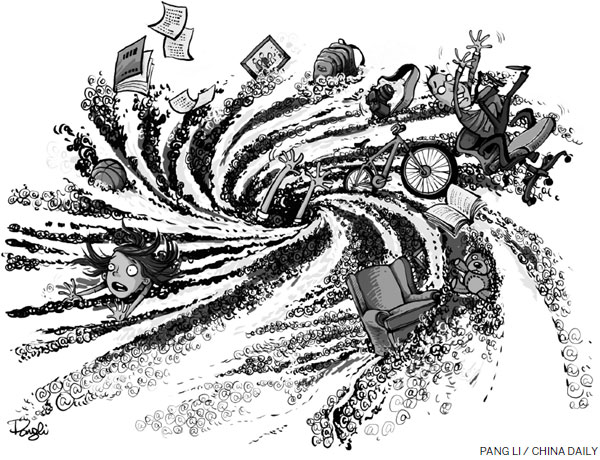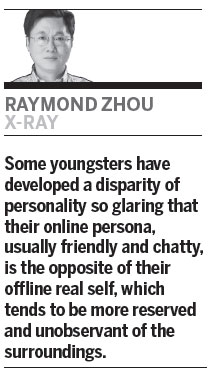Escape from the vortex
Updated: 2014-05-10 07:20
By Raymond Zhou (China Daily)
|
|||||||||||
The fact that the Internet is now available all the time does not mean you have to use it every minute of your waking life.
The Internet has indisputably changed the world, but not necessarily for the better for every member of our society. The convenience it allows is so dazzling it has left quite a few in the vortex of information flooding. And to call it "information" is the same as including "junk food" in the broad category of "food".
Air China recently announced its plan to make the Internet available on its flights, which must be welcome news to many Chinese passengers. Almost all Chinese airports provide free Wi-Fi, which is necessary during delays.

As a frequent flier, I can cope with a few hours of non-access to what's happening on the ground. I can choose to doze off if it's a long flight, or I can browse through the film catalogue. I can bring books or other printed material with me and so avoid touching a gadget for the duration of the flight.
I went through an unplanned experiment when I traveled to the Australian outback recently and stayed for a few days without the Internet. The lodge where I was put up had only one satellite telephone, reserved for emergencies. All we could do was sit around and chat ... oh, and gaze at sunsets and galaxies. I'd never felt so close to nature. Total seclusion from modern communication slowed down my pace of life and sharpened my eyes for little things I never detected before.
Of course, most people, like me, cannot live like a recluse for longer than a few days. But the addiction to the always-on information highway is largely built on the illusion of empowerment. Who in the world needs to field a 24/7 barrage of information inflow but the most powerful people like presidents and corporate executives? They are portrayed in popular culture as giving nonstop instructions or berating underlings while striding through corridors. Actually, it is the underlings who have no choice but leave their cell phones on all the time. It won't be long, I guess, before the choice to switch off will be seen as a show of power.

It was only a little more than a decade ago when being online felt like a boon and a privilege. Now it seems increasingly like an umbilical cord that cannot be severed. For many, it defines them and presents them in their best light, or so they assume. While it is great to be part of a (virtual) community, there's a point when you simply do not want to know more about what's happening in your growing circle, let alone say hello to every one of them on every occasion. Most people are able to adjust and come out of the euphoria of constantly checking on updates and settle into a more healthy balance between the need to communicate and the need for privacy.
If you examine China's weibo (micro blog) scene, the most influential users, such as Yao Chen, are decidedly not the most prolific.
They have learned the art of communicating to a mass audience. But novices tend to treat the platform as a kitchen sink for everything they want to say regardless of who their audience is. I've noticed that people who retweet more than a dozen posts a day are rarely from the media industry. You see, those in my sort of job treat it as work, so the alternative nature of the platform is less important to us.
But I agree that the diligent folks online are good prospects for the media industry. Once they get a taste of completing the workload and beating deadlines, they might lose their enthusiasm as citizen reporters or, more likely, reposters.
Being inundated with options does not mean people will pick the best of them. A new report on the use of mobile Internet by China's young, released by a Chinese technology company, sheds light on the kind of activities most popular with this most active of demographics. There are 140 million people in China who were born in the 1990s. They are from 15 to 24 years old, and 40 percent of them play games for at least one hour a day; an additional 21 percent do it for two hours or longer. Only 8.2 percent of this age group do not play online games.
In addition, these youngsters use their cellphones to watch movies and television shows, making it absolutely clear that the television set's days as the dominating feature of a home are doomed. About 27 percent tune in to their palm-sized entertainment for two hours or more a day. That translates to roughly one feature film or three episodes of a drama series.
Now, there is nothing wrong with any of these activities. It is the excessiveness that can be worrisome. It doesn't take an optometrist to know that squinting at a small screen for too long is bad for your vision. And by far the most frequent use is not educational, to say the least. If a couch potato suddenly gained the supernatural power to move his couch wherever he wanted, mental obesity would be a frequent corollary.
Last week, Chinese newspapers carried a British story about the phenomenon of the selfie carried too far. It quoted an expert who said there are people who are so absorbed in taking a perfect picture of themselves that they have essentially become nut cases. Again, this shows the downside of a perfectly inspiring gadget. While a debate can analyze what's good and what's not with these all-purpose ever-shrinking computers, what concerns me is not even whether the activity is productive. As common sense suggests, too much of a good thing can be bad - at least for most people.
To take a broad view, this is a struggle between moderation and obsession. The technology itself is not at fault here. It is the use of that technology that can throw us into a priority warp. There is something wrong when we have a gathering of family or friends and everyone buries himself or herself in a blog or Twitter or similar communication program, preferring to put those not present, including people they know by online handles only, before those there in the flesh. Some youngsters have developed a disparity of personality so glaring that their online persona, usually friendly and chatty, is the opposite of their offline real self, which tends to be more reserved and unobservant of the surroundings.
In our society of accelerated consumerism, the ability to do everything excessively, such as shop till you drop, is touted as a virtue. It is perceived as living life to the fullest.
Constant use of the Internet, as facilitated by mobile devices, is a natural extension of binge drinking and binge eating. The fact that you can pass off some of the activities as educational is designed to appease tech-ignorant parents, but ends up deluding yourself. ("But, mom, I'm researching a school essay." Never mind that at the same time you're playing a video game, watching the latest soap opera and chatting with a dozen friends.)
This is more like going through the banquet of life grabbing a morsel of everything but never waiting to find out the taste of anything.
Contact the writer at raymondzhou@chinadaily.com.cn.
(China Daily 05/10/2014 page11)
Today's Top News
US museum to return statue to Cambodia
Stronger protection eyed for overseas Chinese
China CPI up 1.8% in April
Thai PM faces ban from politics
Letter asks for leniency in poisoning case
Suspect killed in Xinjiang attack
Chinese premier arrives in Angola for visit
Property tracking system launched
Hot Topics
Lunar probe , China growth forecasts, Emission rules get tougher, China seen through 'colored lens', International board,
Editor's Picks

|

|

|

|

|

|





